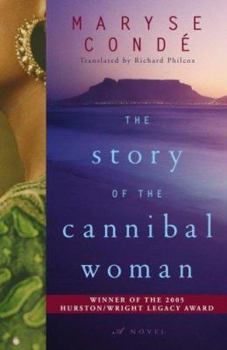The Story of the Cannibal Woman
Select Format
Select Condition 
Book Overview
A vibrant, wildly inventive novel from the winner of the New Academy Prize in Literature (the alternative to the Nobel Prize) and critically acclaimed author Maryse Cond , The Story of the Cannibal... This description may be from another edition of this product.
Format:Hardcover
Language:English
ISBN:0743271289
ISBN13:9780743271288
Release Date:February 2007
Publisher:Atria Books
Length:311 Pages
Weight:1.20 lbs.
Dimensions:1.1" x 6.3" x 8.7"
Related Subjects
Contemporary Fiction Literary Literature & Fiction Mystery, Thriller & Suspense ThrillersCustomer Reviews
1 rating
beautiful narrative style
Published by Thriftbooks.com User , 17 years ago
Cape Town always slept in the same position, curled up in the muzzle of a gun. After hours of grim silence as heavy as a great fur coat of a former Soviet leader, the sound of engines began to sputter and roar throughout the city. This is how internationally renowned writer Maryse Condé starts her 12th novel The Story of the Cannibal Woman ( Histoire de la femme cannibale, translated from French by Richard Philcox). A beautifully crafted work with a vibrant narrative style. The story starts when a notable English literary critic named Stephen Stewart gets killed in the middle of the night. He leaves behind Rosélie Thibaudin, a 50-year-old painter, originally from Guadeloupe, in a rich white neighborhood in Cape Town in the years following the end of apartheid. The story moves on as Rosélie tries to fathom this violent death, also Stephen's feelings, devotion toward her. With her, the reader gets a glimpse of a complicated, egoistic man Stephen and a somewhat indifferent woman, Rosélie. Eventually Condé solves the murder mystery but that is not the main strength of this novel. I loved her style. She goes back and forth between narration and inner monologue. At certain times, I felt she could have limit the use of metaphors but she blends it nicely with some powerful supporting characters and nice use of flashbacks while describing event that takes the reader from Cape Town to Kathmandu. She brings nuggets of cultural references and uses it wisely. Racism and interracial relationship is a theme that permeates the novel. Stephen is white, Rosélie is black, but she is not African black, she is Creole, a different shade. And she got the reputation of being with white men: "Telling him that she hadn't always been the mistress of a white man and that her first partner had been an African would serve no purpose. The stereotypes about Antillean women die hard. They are suppose to hate and despise Black Skins." Or in the case of the school principle Olu Ogundipe who is married to Cheryl, we find another case of stereotypes. Olu says to Rosélie: "I know the Caribbean. I lived there from three years in Kingston and came up against all sorts of humiliations. I've nothing against my in-laws. Admirable people. But Cheryl's family and friends accused of her soiling her sheets with a nigger, black like me, If we ourselves don't like our color, how can we blame the whites for not liking it?" If you love detailed narrative style, this is a must read. Often times it reminded me of Pamuk's Black Book, as she was describing Cape Town. But she does not get into philosophical diatribe. A nice read, highly recommended.






